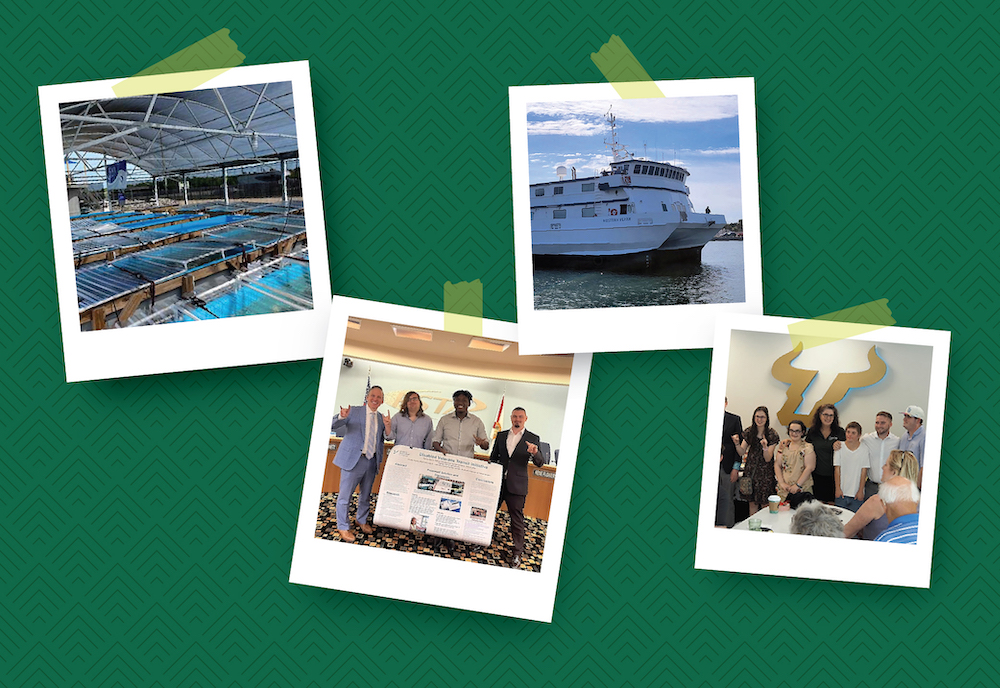This calendar year was full of institutional achievements and international headlines
at USF St. Petersburg.
Students with intellectual disabilities overcame considerable obstacles to achieve
their dreams while others passionate about solving community problems changed policies
countywide. Research activities led to rescuing endangered corals and the creation
of a statewide database to track human trafficking. And state and community support
and the forging of key partnerships expanded programming in marine sciences and the
arts while enhancing scholarships for students.
A transformational budget for USF leads to initial funding of the Environmental and Oceanographic Sciences facility
The state budget for fiscal year 2023-24 was a transformational one for the University
of South Florida, providing significant new increases in recurring operational funding
and investments in other top-priority projects. On the St. Petersburg campus, $24.3
million will fund the first phase of planning and construction of a new Environmental
and Oceanographic Sciences (EOS) Research and Teaching facility.
The EOS facility will house an interdisciplinary center of excellence to harness the
collective power of colleges and departments from throughout the university to address
the existential challenges created by climate change, including sea level rise, high
tide flooding events and other coastal hazards. Building on the world-class reputation
of the College of Marine Science, this center of excellence will bring a variety of
new undergraduate and graduate programs to the St. Petersburg campus to become a national
destination for students and researchers studying issues related to the environment,
oceanography and sustainability.
“There’s incredible energy and momentum in the field of ocean science here in St.
Petersburg,” said Christian Hardigree, regional chancellor of USF St. Petersburg.
“Our goal is to become the global destination for faculty, staff and students who
are driven to find solutions to the challenges posed by sea level rise, a growing
population and sustainably managing our coastal resources.”
Returning rescued corals back to the sea
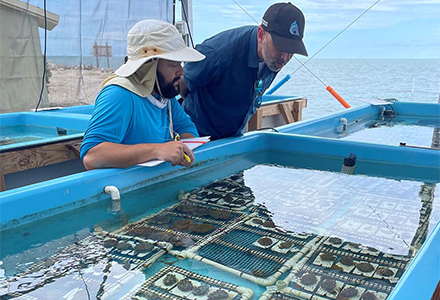
After housing more than 5,000 rescued corals for three months due to unprecedented
water temperatures that caused a massive coral bleaching event off the coast of Florida,
the Florida Institute of Oceanography’s (FIO) Keys Marine Laboratory (KML) returned
corals to the sea. FIO is hosted by the University of South Florida.
In the fall, water temperatures cooled to normal levels to allow for the safe relocation
of corals housed in the on-land seawater systems at KML. Biological scientists, in
partnership with restoration practitioners across the Keys, moved corals back to their
ocean nurseries, a process that took several weeks. Coral nurseries are like floating
Christmas tree farms that allow corals to grow under the care of researchers. Ultimately,
the corals will be reattached to natural reefs using epoxy, cement, zip ties and nails.
“The corals housed at KML came from nurseries where they were growing out in the ocean.
Unfortunately, many of the corals that could not be relocated to land-based facilities
and remained in the ocean died from the hot waters,” said KML Director Cynthia Lewis.
“Conditions became right for corals to return to nurseries to grow and one day be
reattached, thus restoring the reef one coral at a time.”
Forty years of the Tavern
The Tavern at Bayboro is an institution at USF St. Petersburg. This year marked its
40th anniversary of providing food, live music and a social gathering spot for faculty,
staff and students outside of class and work.
Since 1982, the pub has had four owners. Though their styles varied, their outlook
could nicely be summed up by Tom Herzhauser, who owned the Tavern from 2010-2019.
“I always had the feeling that as the owner, I never really owned it. I had the keys
for nine years. It is a treasure in St. Pete and especially on campus. And I always
felt like I’m here for a little bit of time, and don’t screw it up.”
Student proposal leads to free bus rides for Pinellas County veterans
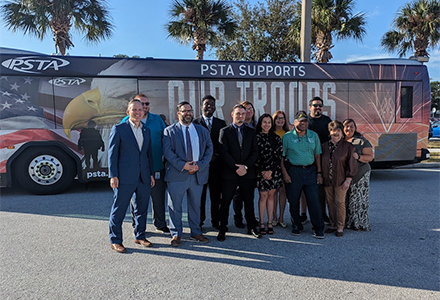
What started as an idea by a student in a USF government class has become official
policy: Veterans can now ride public buses for free in Pinellas County. The proposal,
spearheaded by USF St. Petersburg student and Navy veteran Steven Brown, came out
of a class where students tackle an issue and present their solution to the relevant
governing body.
In March, Brown and the other members of his group, which included Nathan Tout-Puissant,
Andrew Alan and Naveh Coleman, presented their proposal to allow Pinellas County disabled
veterans to ride public buses for free in front of the Pinellas Suncoast Transit Authority
(PSTA) Board of Directors and received a positive response. On May 24, the board took
up a vote on the proposal and approved it overwhelmingly. The board then went one
step further, passing a motion to allow all Pinellas County veterans to ride PSTA
buses for free starting November 10, 2023.
“This class really got me to think how you can affect real change in society if you
have the tools and motivation at your disposal,” said Brown, who plans to continue
advocating for veteran issues post-graduation. “It’s been an honor to be able to make
a positive change that improves the community welfare of veterans.”
Ship granted to USF will enhance Florida Institute of Oceanography’s efforts to build a robust ocean science and maritime workforce
After a 4,000-mile journey, a 117-foot twin-hulled ship granted to USF docked at its
new home port in St. Petersburg, where it will be operated by the Florida Institute
of Oceanography (FIO) to offer transformative opportunities for students to explore
and advance the field of ocean science.
Called Research Vessel Western Flyer, the ship was granted to USF by the Monterey
Bay Aquarium Research Institute. It is the most technologically advanced vessel in
the FIO fleet. While FIO’s other research vessels, Weatherbird II and Hogarth, operate
primarily within Florida waters, the Western Flyer will embark on expeditions further
afield – operating in waters off the southeastern U.S. and stretching into the northern
Caribbean Sea. Capable of longer missions and with additional berths, the added capacities
will allow more interdisciplinary expeditions including at-sea development opportunities
for research, engineering, maritime trades and other STEM careers.
“The addition of this magnificent ship will strengthen the University of South Florida’s
position as a global leader in sustainability, environmental and oceanographic sciences,”
USF President Rhea Law said. “We are honored to accept this generous gift from the
Monterey Bay Aquarium Research Institute. The Western Flyer will provide new real-world
opportunities for students, help us fill the talent pipeline to meet workforce needs
and expand our research capabilities.”
Governor signs bill making USF lab state repository for human trafficking data
Florida Governor Ron DeSantis signed into law a bill that makes the USF Trafficking
in Persons (TIP) Risk to Resilience Research Lab the statewide repository for anonymous
human trafficking data. As part of the larger Senate Bill 7064, which supports victims
of human trafficking and strengthens penalties for human traffickers, the provision
allows the TIP Lab to collect and analyze statewide data to better understand the
magnitude and trends in human trafficking across the state and over time.
The lab is also tasked with evaluating the effectiveness of state-funded initiatives
to combat trafficking and will work with law enforcement and state agencies to report
data on human trafficking investigations and prosecutions, which can aid those agencies
in combatting human trafficking and individuals.
“The creation of a unified database for human trafficking will be transformational
for this region and for Florida,” said Joan Reid, USF professor of criminology and
director of the TIP Lab. “It will allow us to have a more accurate picture of the
prevalence and patterns related to human trafficking in the state in order to better
combat and reduce this illegal activity.”
First cohort of students with intellectual disabilities completes UMatter Program
As a student with an intellectual disability, 21-year-old Luke King wasn’t sure he
could ever attend college. But thanks to an inclusive postsecondary education program,
the Sarasota native spent the past two years at USF St. Petersburg and is now ready
to pursue a career and live on his own.
King and five others were the first cohort of students to graduate from the Eileen
Hoffman Hafer UMatter Program, receiving a certificate of completion at the end of
the Spring 2023 semester. This innovative program provides young adults with intellectual
disabilities the opportunity to experience higher education and campus life, learning
social skills and career training along the way.
“I always wanted to come somewhere where I could make changes and be more confident
to do other things in the world,” King said. “It’s not something that comes to you;
it’s something that you have to work to get and hope that things work out.”
The UMatter program was launched in 2020 through a $900,000 grant awarded by the Florida
Center for Students with Unique Abilities. In 2021, USF received a $1.2 million gift
from Andrew and Eileen Hafer to help fund its operations and initiatives. In addition
to the six graduates, five students entered their second year, and another cohort
of ten started in August.
Inaugural Bulls and Brews by the Bay raises $80k in funds for student scholarships
More than 250 USF alumni, donors and friends donned lederhosen and dirndls for a good
cause during the first-ever Bulls and Brews by the Bay. Nearly $80,000 was raised
during the inaugural "Okto-BULL-fest” event, which means the campus will be able to
provide ten times as many scholarships from the USF St. Petersburg Scholarship fund
during the 2024-2025 academic year compared to the previous year.
The waterfront event featured an array of craft beer selections from local breweries,
as well as non-alcoholic options. There was also a traditional German menu curated
by USF Dining, which included bratwurst, sauerkraut and pretzels. Owners and brewers
from several St. Petersburg area breweries donated the craft beer in honor of USF's
Brewing Arts Program.
"We were thrilled that our supporters responded so positively to our Bulls and Brews
by the Bay event,” said Howard Rutherford, associate vice president of development
for University Advancement. “We are excited to build on the success and create momentum
for an annual USF St. Petersburg campus tradition.”
Who’s hunting the black widow spider? Their brown widow relatives, research shows
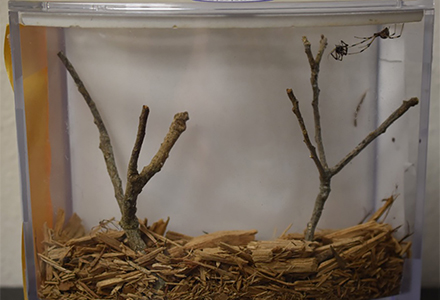
Brown widow spiders are seeking out and killing their black widow relatives, a surprising
twist in the natural relationship between species of spiders known for their venomous
bites, according to research out of USF St. Petersburg. Researchers found that in
a container habitat, brown widows were 6.6 times more likely to attack black widows
than other related species. The behavior is likely a driver of the black widow spider’s
population decline.
The study also revealed that both brown and black widow species are more likely to
die of predation than starvation, suggesting that “competition for scarce resources
is not a significant cause of mortality among spiderlings for either species,” the
researchers said.
“We have established brown widow behavior as being highly aggressive towards the southern
black widows, yet much more tolerant of other spiders within the same family,” said
Louis Coticchio, who led the study as part of his undergraduate research at USF along
with advisor Deby Cassill, associate professor in the Department of Integrative Biology.
USF Contemporary Art Museum’s inaugural GENERATOR exhibition opened on the St. Petersburg campus
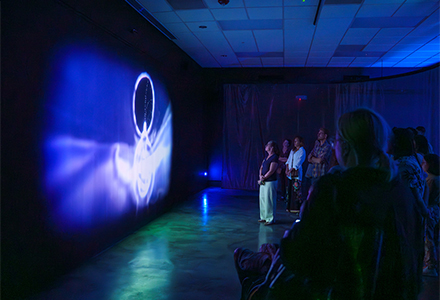
As part of its ongoing expansion of arts programming across the bay, the USF College
of The Arts’ Contemporary Art Museum (USFCAM) presented the inaugural GENERATOR exhibition
on the St. Petersburg campus. GENERATOR is an expansion of USFCAM, which seeks to
be an incubator of new ideas and a place for expanded artistic experimentation.
The opening exhibition was titled SUPERFLEX: This Is The Tip Of The Iceberg, which explored a world where human life depends on coexistence with other species.
The installation, by internationally renowned Danish artist collective SUPERFLEX,
immersed viewers in two parallel and interconnected realms – a terrestrial space unsettled
by rising water and a submerged space in the ocean’s depths – to signify the impacts
and consequences of climate change, especially relevant to Florida and its coastal
communities. The free exhibition ran from October 6 through November 22 in the Harbor
Hall Gallery at USF St. Petersburg.
“The city of St. Petersburg is an art mecca, with so many great museums, galleries
and artists that create such a vibrant culture. It is only natural for our campus
to not only provide a stellar arts education to students, but foster events and programming
that contribute to the growing art scene in our city,” said Christian Hardigree, regional
chancellor of USF St. Petersburg.
